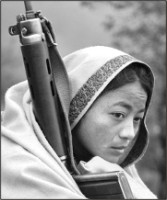Human Rights analysis
Culture of impunity risks Nepal's peace process, UN senior official warns
 United Nations Deputy High Commissioner for Human Rights Kyung-wha Kang, who recently visited to different troubled spots of Nepal, has expressed her concern on the need to end impunity on 3 February. She said, "The consolidation of the peace process will continue to be at risk without political will on the part of the authorities to end this culture of impunity".
United Nations Deputy High Commissioner for Human Rights Kyung-wha Kang, who recently visited to different troubled spots of Nepal, has expressed her concern on the need to end impunity on 3 February. She said, "The consolidation of the peace process will continue to be at risk without political will on the part of the authorities to end this culture of impunity".
Referring to the visit by High Commissioner for Human Rights last year, she said that impunity remains unchecked in Nepal and not one perpetrator of the past or on-going human rights violations has been convicted. The High Commissioner had made a similar statement also after her visit.
An estimated 13,000 people were killed during the civil conflict that formally ended when the government of Nepal and the Communist Party of Nepal (Maoists) signed a peace accord in 2006. The agreements between the parties include the establishment of a commission on disappearances and a commission on truth and reconciliation.
These are important measures “to bring out the truth, address the past, and also the underlying causes of the conflict with a view to ensuring that the violations of the past are not repeated”, she stressed. She stressed that the Truth and Reconciliation Commission (TRC) has to be established and put into operation in accordance with international standards to end the culture of impunity in Nepal.
Kang also said that the security vacuum in the Terai plains had led to sectarian violence. "Perpetrators can be identified but the victims have no confidence in the justice system after having experienced violence and displacement on multiple occasions", she said.
She pointed out that the law enforcement agencies need to represent the population and need to enforce the law firmly and impartially respecting human rights in order to gain the trust of the affected communities in Tarai.
Pointing out that ongoing impunity as well as a security vacuum due to weak law enforcement and criminal justice had led to an increase in violent actions, including killings and abductions by armed groups, Kang said, “These acts of violence only serve the interests of those seeking to disrupt the peace process and will make more difficult the holding of free and fair elections”.
The elections for the Assembly, which was supposed to draft a new constitution for Nepal, were originally scheduled to be held in June last year. However they were postponed because of continuing mistrust between the government and the Maoists.
In addition, the Deputy High Commissioner noted that discrimination based on caste, gender or ethnicity remains “entrenched” in Nepali society. She stressed the need to address the problem “or it will continue to place the peace process at risk”.
She, however, expressed satisfaction over some of the developments including in addressing the situation of marginalised groups and appointment of commissioners to the National Human Rights Commission (NHRC).
Source: Asian Forum for Human Rights and Development.
US seeks death penalty for Guantánamo detainees
The Pentagon announced on Monday that it has charged six "high-value" detainees at Guantánamo Bay. The US government is seeking the death penalty against the six men.
A spokesperson for Amnesty International condemned the move, saying the charges raise yet more questions about the USA's conduct in the "war on terror".
"A matter of weeks after the United Nations General Assembly voted for an end to executions, the USA is raising the spectre of death sentences after fundamentally flawed trials in Guantánamo. The international community must challenge the USA to drop these military commissions and conduct trials in front of independent and impartial courts, without resort to the death penalty," said Rob Freer, Amnesty International's researcher on USA.
Five of the six men charged were held for more than three years in secret CIA custody at unknown locations before being transferred to Guantánamo in September 2006. The CIA has also confirmed that at least one of the men charged, Khalid Sheikh Mohammed, was subjected to "waterboarding" simulated drowning. "Waterboarding is torture, and torture is an international crime. No one has been held accountable for such crimes. Impunity in relation to the CIA program remains a hallmark of the USA's conduct in the 'war on terror,'" said Rob Freer. "Ever since the crime against humanity that was committed on 11 September 2001, Amnesty International has called on the USA to pursue justice and security within a framework of respect for human rights and the rule of law. The US government's systematic failure to do this is illustrated not only by the treatment of these six detainees over the past five years or more, but also by the military commissions before which they are set to appear."
The sixth man charged is Mohamed al-Qahtani, who was subjected to torture and other ill-treatment in Guantánamo in late 2002. Despite suffering sexual and other humiliation, sleep deprivation, hooding, stripping, loud music, white noise, and extremes of heat and cold, the Pentagon concluded that his treatment did not amount to inhumane treatment.
"The Pentagon, along with the President, has overarching influence over the operation of the military commissions," said Rob Freer. "In other words, these sub-standard tribunals lack independence from the same executive branch that has authorized and condoned systematic human rights violations committed against these detainees."
Source: Amnesty International Press release.